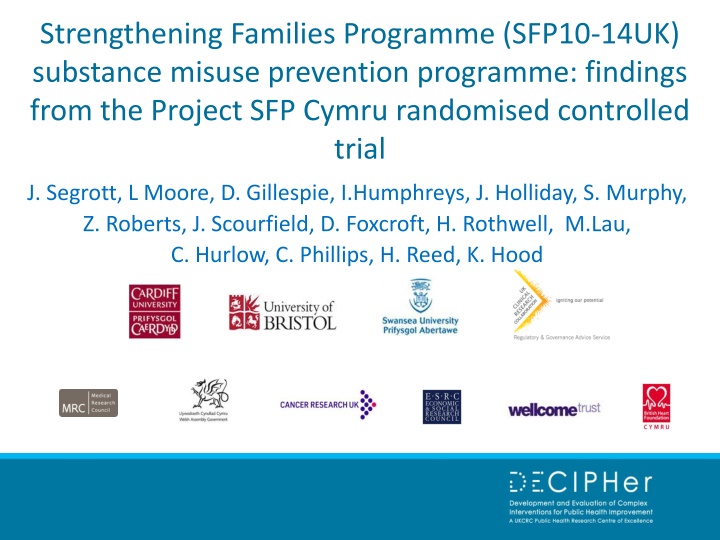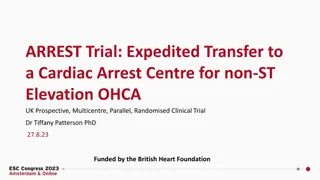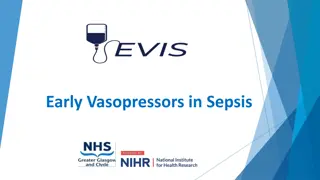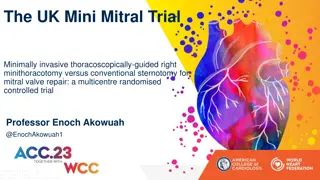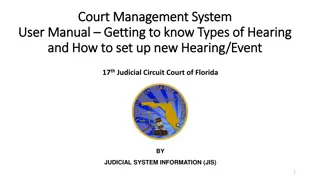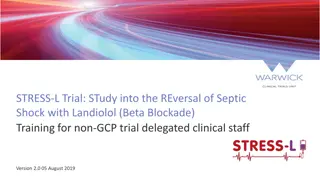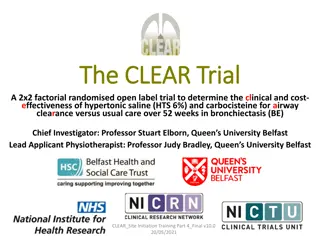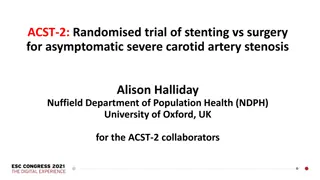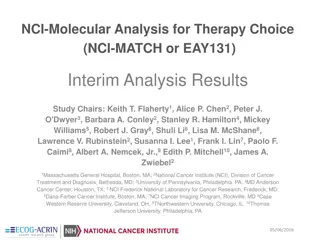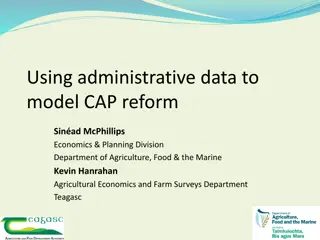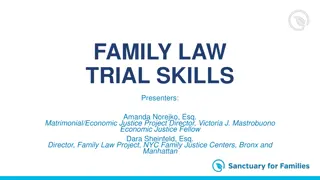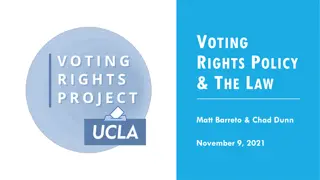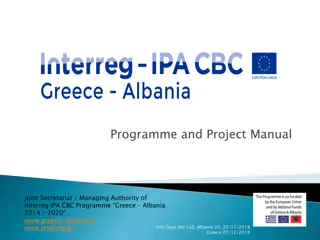SFP10-14UK Programme: Project SFP Cymru Trial Findings
This study presents findings from the randomised controlled trial of the Strengthening Families Programme (SFP10-14UK) in substance misuse prevention. The research, conducted by J. Segrott, L. Moore, and D., explores the impact and effectiveness of the programme, specifically focusing on its implementation in Project SFP Cymru. The results shed light on the program's efficacy in addressing substance misuse among adolescents aged 10-14 within the UK context.
Download Presentation

Please find below an Image/Link to download the presentation.
The content on the website is provided AS IS for your information and personal use only. It may not be sold, licensed, or shared on other websites without obtaining consent from the author.If you encounter any issues during the download, it is possible that the publisher has removed the file from their server.
You are allowed to download the files provided on this website for personal or commercial use, subject to the condition that they are used lawfully. All files are the property of their respective owners.
The content on the website is provided AS IS for your information and personal use only. It may not be sold, licensed, or shared on other websites without obtaining consent from the author.
E N D
Presentation Transcript
Strengthening Families Programme (SFP10-14UK) substance misuse prevention programme: findings from the Project SFP Cymru randomised controlled trial J. Segrott, L Moore, D. Gillespie, I.Humphreys, J. Holliday, S. Murphy, Z. Roberts, J. Scourfield, D. Foxcroft, H. Rothwell, M.Lau, C. Hurlow, C. Phillips, H. Reed, K. Hood
Presentation Outline Background Trial Design and Implementation Process Evaluation findings Main trial findings Summary
Families and substance misuse prevention Family relationships/parenting are important risk and protective factors Family relationships/parenting are an important target for intervention Governmental/policy interest in family support/interventions Interventions are often implemented without rigorous evaluation Evidence base dominated by interventions/evaluations from the USA
Strengthening Families Programme 10-14 Universal substance misuse prevention intervention Delivered to groups of families with children aged 10-14 Focuses on parenting, family functioning and young people s peer- pressure resistance skills Theoretical basis includes: biopsychosocial model; family process model; resiliency model; social ecology model Evidence of effectiveness from US trials in delaying initiation and use of substances (e.g. Spoth, et al. 2001, 2002, 2005) SFP10-14 adapted for use in UK
Strengthening Families Programme 10-14 Delivered to groups of families (parents & their children aged 10-14) Seven weekly sessions Hour 1: parents and young people in separate groups skills development Hour 2: parents and young people work together to practise skills Extensive use of videos (especially parents hour)
Background to the current trial Evaluation of SFP in Cardiff for Welsh Government to examine potential as a national programme for Wales (Segrott, 2014) Welsh Government funding for SFP in three locations Agreed that programme funding would be as part of a trial Included training and mentoring to delivery teams Support from Government in trial application process Research team secured funds for research trial and programme delivery in three additional locations (National Prevention Research Initiative)
Project SFP Cymru: Trial Design Pragmatic RCT with families as the unit of randomisation Target size = 756 families across 7 trial sites Embedded process and economic evaluations Comparing normal care with normal care SFP 10-14 SFP10-14 delivered by charity and local government agencies Implementation systems designed to mirror normal practice Researchers embedded in delivery teams during recruitment
SFP10-14: group composition strategy Adapted UK programme delivered in Cardiff Identified implementation risks from comprising groups of families with high levels of challenge Developed mixed families (70/30) approach Aimed to form groups of (5-12 families) comprised of Families with no challenges in a group setting (70%) Families who may experience/present challenges within a group setting (30%) Examples of challenges: young person not attending school; ADHD; low literacy skills; learning difficulties 70/30 mix aims to maximise fidelity, promote positive group dynamics/behaviour change, and maximise retention
Trial Outcomes Two Primary outcomes: number of occasions that young people report having drunk alcohol and been drunk during the last 30 days, dichotomised as never and 1-2 times or more Secondary outcomes (substance use): use of cannabis; weekly smoking; age of alcohol use initiation; frequency of drinking; frequency of different types of alcoholic drinks; drink related problems; age of initiation of use of drugs and tobacco Other secondary outcomes: family functioning; parenting; peer pressure resistance skills in young people wellbeing and stress depression, GCSE performance
Data collection from families Questionnaires with parents and young people 0 months Observation of programme sessions Telephone interviews with parents 9 months Telephone interviews with parents 15 months Questionnaires with parents & young people 24 months
Process evaluation Assessed o adherence to content & implementation requirements o dose delivered (number of programmes organised); o dose received (extent of participant engagement); o reach (proportion of families that participated in SFP); o recruitment of participants
Process evaluation methods: Data Collection Fidelity assessment: facilitator-completed score sheets for each programme hour (50 out of 56 programmes) 47 (12% of 392) sessions were also observed by researchers to estimate the reliability of facilitator reports of coverage of activities Routine data from each programme on delivery dates, venues, and staff; attendance, and uptake of child care and transport by families Semi-structured interviews with SFP staff to explore implementation processes and contextual factors
Implementation within the trial Local agency partnerships appointed a progamme coordinator Staff from local agencies trained as SFP facilitators and committed to facilitate SFP during all seven weeks of at least one programme Families came forward in response to awareness-raising in the community or were referred by practitioners in local services Programmes were delivered in schools and other community facilities with a target capacity of 10-12 families per programme
Findings I: What was delivered? 715 families recruited to the trial (361 to intervention arm) 47/56 programmes achieved target group size (5-12 families) However 60% of sessions ran with fewer than 5 families 287/361 (80%) of families attended at least one session 218/361 (60%) received intervention (attended 5 or more sessions) 119/361 (33%) attended all 7 sessions Facilitators rated participant engagement high in 94% of activities No evidence that small groups affected engagement
Findings I: What was delivered? 22/56 (39%) of groups fully achieved the target group composition Most of the remaining programmes still achieved a mix of families Good adherence to staffing levels (3 or more staff) and consistency Facilitators rated 96% of activities as mostly/fully covered This varied across trial sites from 90-99%
Findings II: Project SFP Cymru set up Significant commitment to for the intervention SFP was welcomed as filling a gap served 10-14 year olds, and brought parents and their children together Practitioners thought SFP benefited families by improving relationships and skills They saw that SFP would help them in their professional roles This energised local partnerships to incorporate SFP into everyday practice by rearranging roles, responsibilities and resources necessary Training helped trainees to gain a good understanding of programme theory and design
Findings III: SFP implementation Difficulties in assembling facilitators for preparation meetings Link between coverage rates and extent to which preparation meetings were held as intended Part of a wider problem affecting facilitator recruitment and retention Capacity to release staff for SFP decreased following funding cuts Qualitative data suggested that fidelity to staffing standards would be low, but quantitative data indicated the opposite Increasing reliance on staff from coordinators own agency in three areas made requirements workable Multi-agency staffing was maintained in two areas where coordinators were in post throughout the trial
Findings III: Recruitment and retention All co-ordinators reported difficulties in recruiting families to the trial o Recruiting from the general population differed from recruiting from a defined client group which was the norm o Co-ordinators contacts were with other agencies primarily concerned with supporting vulnerable and needy groups o They were recruiting to a trial and only half of the families recruited were allocated to receive SFP Some professionals were reluctant to refer families because those allocated to the control group would not receive SFP
Key points from process evaluation SFP was delivered with good fidelity: high levels of adherence to programme content but some variation Targets on group composition not always achieved, but most groups comprised a mix of families with / without challenges High levels of adherence and engagement suggest that variations in group composition / size did not impact significantly on delivery / group dynamics High levels of commitment towards SFP among practitioners appeared to have a positive influence on fidelity SFP10-14 was workable, but levels of multi agency staffing capacity reduced during the trial Recruitment a key challenge, with concerns about randomisation and universal provision reducing potential among some referrers
Trial recruitment and retention 715 families randomised 931 Young People (YP), 919 Parents/Carers (PC) 354 families randomised to Control 454 YP, 459 PC 361 families randomised to SFP 477 YP, 460 PC 240PCs completed 9 month telephone follow-up (52%) 288PCs completed 9 month telephone follow-up (63%) 220PCs completed 15 month telephone follow-up (48%) 166 PCs completed 15 month telephone follow-up (36%) 354YPs completed 24 month face- to-face follow-up (78%) 316PCs completed 24 month face- to-face follow-up (69%) 403YPs completed 24 month face- to-face follow-up (85%) 377PCs completed 24 month face- to-face follow-up (82%)
Findings: Baseline Characteristics No differences of major note between trial arms Demographic Young person (YP) Parent/carer (PC) Median age (IQR) 12 (10 to 13) 37 (32 to 43) % Female 46 77 % White British 85 81 Substance use in YPs % Substance use in PCs % Ever tried a cigarette 27 Smoker 52 Usually smoke > 6 cigarettes a week 5 Never drink alcohol 19 Had a proper alcoholic drink 31 High risk from problematic drinking 34 Been a little bit drunk 17 (AUDIT-C) Been very drunk 7 Used drugs at least once in lifetime 34 Tried drugs 5
Alcohol use primary outcome Response to the question: On how many occasions in the last 30 days have you drunk alcohol? By young people at their 24 month follow-up interview Response options ranged from 0 to 40+ occasions Dichotomised for the primary analysis 0 / 1 or more occasion Statistical analysis: Two-level logistic regression (young people nested within families) Variables balanced on at randomisation controlled for in model (area, family categorisation and family-average age of young people) Baseline alcohol use also controlled for ( Have you ever had a proper alcoholic drink, not just a sip? )
Alcohol use primary outcome Secondary analyses of alcohol use primary outcome: Without controlling for anything Controlling for gender Controlling for time from randomisation to 24 month follow-up interview As an ordinal outcome (fully adjusted) As an ordinal outcome (unadjusted) Controlling for intervention receipt (binary) Controlling for intervention receipt (quantitative)
Alcohol use primary outcome Subgroup analyses for alcohol use primary outcome: Age of young person at baseline Gender of young person Smoking behaviour of young person at baseline Drinking behaviour of parent/carer at baseline Socioeconomic status of young person at baseline (Family Affluence Scale) Highest occupational status at baseline Family categorisation at baseline (family with/without challenges) Young person strengths and difficulties score at baseline Young person cohesion domain of Family Relationship Index Young person expressiveness domain of Family Relationship Index Young person conflict domain of Family Relationship Index Young person General Child Management score at baseline Average YP-reported Whether or not scores differed across YPs Average PC-reported Whether or not scored differed across PCs
Drunkeness primary outcome Response to the question: On how many occasions in the last 30 days have you been drunk? By young people at their 24 month follow-up interview Response options ranged from 0 to 40+ occasions Dichotomised for the primary analysis 0 / 1 or more occasion Statistical analysis: Same methods as for past month drinking Baseline drunkenness controlled for instead of alcohol use ( Have you ever had so much alcohol that you were a little bit drunk? )
Findings: Primary Outcomes Adjusted odds ratio (SFP vs. Control) Outcome Control % SFP % 95% CI p-value Drunk alcohol in the 30 days prior to 24 month interview 24.6 26.5 1.12 0.72 1.73 0.625 Been drunk in the 30 days prior to 24 month interview 8.3 10.2 1.45 0.83 2.52 0.195 No evidence of a between-group difference on either primary outcomes Conclusions unaltered by: Various pre-planned adjusted analyses Non-receipt of intervention Missing data adjustments No strong evidence of differential intervention effects according to pre-planned subgroups Some potential differential effects according to: Baseline parenting skills (as perceived by YP) Family categorisation
Findings: Secondary Outcomes At 24 months, no evidence of a between-group difference on any of the other substance use outcomes Alcohol-related problems in previous 12 months, weekly smoking, cannabis use (ever/last 12 months/last 30 days), time to alcohol/tobacco/drug use initiation (all YP-reported) Some borderline evidence of better parenting/family-based outcomes for those randomised to SFP Parenting skills (YP and PC perceived), parent-child bonding, family cohesion, family conflict Adjusted mean difference (SFP vs. Control) Outcome 95% CI p-value YP-perceived parenting skills 0.08 0.00 0.16 0.050 PC-perceived parenting skills 0.05 -0.01 0.10 0.097 PC-perceived parent-child bonding -0.07 -0.15 0.01 0.074 PC-perceived family cohesion -0.20 -0.44 0.03 0.095 PC-perceived family conflict -1.70 -3.48 0.08 0.061
Findings: Secondary Outcomes Some borderline evidence that the odds of reporting full health (using EQ- 5D) was lower in those randomised to SFP YP-adjusted OR: 0.65 (95% CI: 0.39 to 1.08) PC-adjusted OR: 0.66 (95% CI: 0.44 to 0.98) Mostly due to differences in the anxiety/depression and pain/discomfort domains No evidence of a between-group difference on any of the other secondary outcomes Antisocial and prosocial behaviour of peers, strengths and difficulties, self-efficacy, security/attachment, family expressiveness
Findings: Subgroup Effect of Family Categorisation Families without challenges in a group setting 30 Percentage of participants with a YES response 25 20 15 10 5 0 GP FWC GP FWC GP FWC GP FWC GP FWC GP FWC Drunk alcohol (last 30 days) Been drunk (last 30 days) Weekly smoking Cannabis (ever) Cannabis (last 12 months) Cannabis (last 30 days) Control SFP
Findings: Subgroup Effect of Family Categorisation Families with challenges in a group settings 30 Percentage of participants with a YES response 25 20 15 10 5 0 GP FWC GP FWC GP FWC GP FWC GP FWC GP FWC Drunk alcohol (last 30 days) Been drunk (last 30 days) Weekly smoking Cannabis (ever) Cannabis (last 12 months) Cannabis (last 30 days) Control SFP
Other European trials Trials in Germany (Baldus, et al. 2016), Poland (Foxcroft, et al. 2016) & Sweden (Sk rstrand, et al. 2013) mirrored the findings of the Wales trial Germany and Poland similar kinds of adaptations to the UK Swedish adaptation (Sk rstrand, et al. 2008) made major changes to the intervention undermined intervention mechanisms? (see Segrott, et al. 2014)
Summary of trial findings Overall: No evidence of any differences on any of the young person reported substance use outcomes at 24 months SFP10-14 delivered with good fidelity (coverage, staffing, group dynamics) Some evidence (albeit small differences, which were not statistically significant) that SFP had a positive effect on parenting skills, parent-child bonding, family cohesion, and family conflict Some evidence (albeit small differences) that SFP had a negative effect on health-related quality of life in young people and parents at 24 months mostly driven by differences in levels of anxiety or depression No evidence of any differences in terms of antisocial and prosocial behaviour, behavioural difficulties, self-efficacy, security/attachment, and family expressiveness Some evidence to suggest that SFP may have been beneficial for families with challenges, but harmful for families without challenges in a group setting
Trial publications Trial protocol: Preventing substance misuse: study protocol for a randomised controlled trial of the Strengthening Families Programme 10 14 UK (SFP 10 14 UK) | BMC Public Health | Full Text (biomedcentral.com) Main findings paper: Effectiveness of the Strengthening Families Programme in the UK at preventing substance misuse in 10 14 year-olds: a pragmatic randomised controlled trial | BMJ Open Process evaluation paper: An application of Extended Normalisation Process Theory in a randomised controlled trial of a complex social intervention: Process evaluation of the Strengthening Families Programme (10 14) in Wales, UK - ScienceDirect Commentary on Swedish adaptation of SFP10-14: Cultural adaptation and intervention integrity: a response to Sk rstrand, Sundell and Andr asson | European Journal of Public Health | Oxford Academic (oup.com)
Acknowledgements Project SFP Cymru was funded by the National Prevention Research Initiative (http://www.npri.org.uk) Funding partners: Alzheimer s Research Trust; Alzheimer s Society; Biotechnology and Biological Sciences Research Council; British Heart Foundation; Cancer Research UK; Chief Scientist Office, Scottish Government Health Directorate; Department of Health; Diabetes UK; Economic and Social Research Council; Engineering and Physical Sciences Research Council; Health & Social Care Research & Development Office for Northern Ireland; Medical Research Council; The Stroke Association; Welsh Government; and World Cancer Research Fund Additional funding for programme delivery was provided by the Welsh Government. Cardiff Drug and Alcohol team provide financial support for recruitment through schools. DECIPHer provided support for project staffing and coordination.
